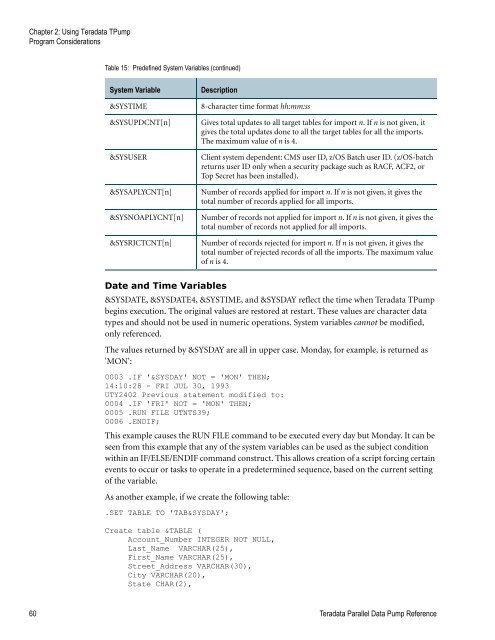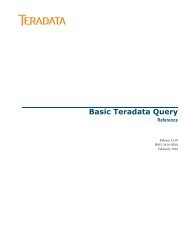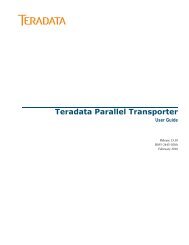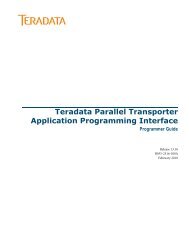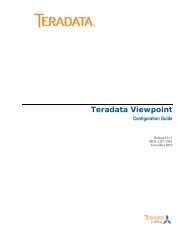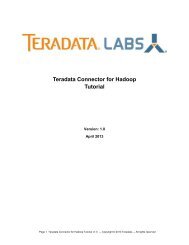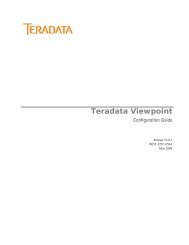Teradata Parallel Data Pump
Teradata Parallel Data Pump Reference - Teradata Developer ...
Teradata Parallel Data Pump Reference - Teradata Developer ...
- No tags were found...
You also want an ePaper? Increase the reach of your titles
YUMPU automatically turns print PDFs into web optimized ePapers that Google loves.
Chapter 2: Using <strong>Teradata</strong> T<strong>Pump</strong><br />
Program Considerations<br />
Table 15: Predefined System Variables (continued)<br />
System Variable<br />
&SYSTIME<br />
&SYSUPDCNT[n]<br />
&SYSUSER<br />
&SYSAPLYCNT[n]<br />
&SYSNOAPLYCNT[n]<br />
&SYSRJCTCNT[n]<br />
Description<br />
8-character time format hh:mm:ss<br />
Gives total updates to all target tables for import n. If n is not given, it<br />
gives the total updates done to all the target tables for all the imports.<br />
The maximum value of n is 4.<br />
Client system dependent: CMS user ID, z/OS Batch user ID. (z/OS-batch<br />
returns user ID only when a security package such as RACF, ACF2, or<br />
Top Secret has been installed).<br />
Number of records applied for import n. If n is not given, it gives the<br />
total number of records applied for all imports.<br />
Number of records not applied for import n. If n is not given, it gives the<br />
total number of records not applied for all imports.<br />
Number of records rejected for import n. If n is not given, it gives the<br />
total number of rejected records of all the imports. The maximum value<br />
of n is 4.<br />
Date and Time Variables<br />
&SYSDATE, &SYSDATE4, &SYSTIME, and &SYSDAY reflect the time when <strong>Teradata</strong> T<strong>Pump</strong><br />
begins execution. The original values are restored at restart. These values are character data<br />
types and should not be used in numeric operations. System variables cannot be modified,<br />
only referenced.<br />
The values returned by &SYSDAY are all in upper case. Monday, for example, is returned as<br />
'MON':<br />
0003 .IF '&SYSDAY' NOT = 'MON' THEN;<br />
14:10:28 - FRI JUL 30, 1993<br />
UTY2402 Previous statement modified to:<br />
0004 .IF 'FRI' NOT = 'MON' THEN;<br />
0005 .RUN FILE UTNTS39;<br />
0006 .ENDIF;<br />
This example causes the RUN FILE command to be executed every day but Monday. It can be<br />
seen from this example that any of the system variables can be used as the subject condition<br />
within an IF/ELSE/ENDIF command construct. This allows creation of a script forcing certain<br />
events to occur or tasks to operate in a predetermined sequence, based on the current setting<br />
of the variable.<br />
As another example, if we create the following table:<br />
.SET TABLE TO 'TAB&SYSDAY';<br />
Create table &TABLE (<br />
Account_Number INTEGER NOT NULL,<br />
Last_Name VARCHAR(25),<br />
First_Name VARCHAR(25),<br />
Street_Address VARCHAR(30),<br />
City VARCHAR(20),<br />
State CHAR(2),<br />
60 <strong>Teradata</strong> <strong>Parallel</strong> <strong>Data</strong> <strong>Pump</strong> Reference


